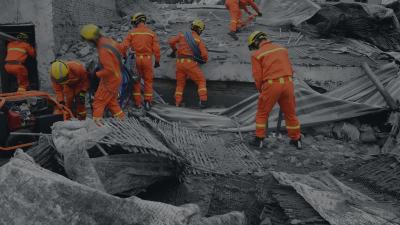
Improving access to redress for workers vulnerable to violence and harassment in South Asia
Experts discuss the factors that make some workers more vulnerable than others to violence and harassment.
This page is approximately a 4 minute read
This page was published on

total investment by Lloyd's Register Foundation in 2023 into projects to put the World Risk Poll into action.
Dr Andrea Taylor explains how the project will reduce harm from severe weather events.
Over the past 50 years there has been a five-fold increase in recorded weather-related disasters, with the World Meteorological Organisation (WMO) attributing two-million deaths and $3.64 trillion in losses to these events. With a changing climate set to increase the frequency and severity of severe weather events in many areas of the world, effective early warning messaging is needed to help members of the public to reduce the risk that these events pose to themselves and their households. With countries differing in terms of culture, climate profile, socio-economic development, government structures and risk governance, understanding what forms of risk messaging work best in these different contexts is of critical importance. In this project we will develop and test communications strategies in a subset of countries with different characteristics to provide recommendations to improve warning communication, with the ultimate goal of reducing harm from severe weather events.
We will use the World Risk Poll to gain an overview of perceptions of weather and climate risk as well as risk preparedness across countries. Using a statistical approach called multi-level modelling, we will examine the factors that predict risk perception and preparedness across different countries, as well as those that are country and context specific (such as climate). Combining the findings of this analysis with input from national meteorological services, risk reduction practitioners, NGOs and the WMO, we will select an indicative set of focal countries with different climate profiles and risk governance contexts for which to develop and test weather warning communication strategies. Through this process we will develop communication recommendations for multi-hazard early warning systems.
The objective of this project is to reduce harm from severe weather events by improving risk communications to public audiences in different countries, so as to increase levels of appropriate weather risk response behaviours. By gaining a fuller understanding of the factors driving risk perception and preparedness, we can identify an indicative set of four or five countries representing different climate profiles, cultural contexts and risk governance structures, for which to develop and test weather warning communication strategies. The results of this, alongside working with national meteorological services and organisations involved in disaster risk reduction, mean we will be able to make recommendations to improve weather warnings which can be used by such organisations in a wider range of countries.
The World Risk Poll data provides us with a unique opportunity to conduct a global analysis of climate and weather risk perception and risk preparedness, as well as providing the opportunity to track changes across the 2019, 2021 and 2023 datasets. Never before has it been possible to carry out such rigorous cross-country and across time comparisons. Moreover, through linking this data with other databases and sources of information such as the International Disasters Database, World Governance Indicators and the Intergovernmental Panel on Climate Change, we will be able to identify the factors that predict climate risk perception and preparedness at both an individual and regional level.
This analysis will form the basis of our identification of indicative focal countries in which to develop and test weather warning communications. The 2025 World Risk Poll will allow a further opportunity to validate conclusions drawn from this work and test predictions about risk perceptions and preparedness.
We are keen to talk to practitioners in the field of disaster risk reduction as well as in agencies and organisations that are responsible for providing or disseminating weather warnings. While we are already in contact with the WMO about this project, we would also welcome input from other UN agencies (such as the World Health Organization) and the World Bank.
It would also be of use to engage with organisations impacted by severe weather events as to their experiences around risks and communication. This could include national, regional and local governments, business and trade organisations and major firms (including engaging with businesses to work with their supply chains and with the logistics and transport sectors), NGOs and local voluntary and community sector organisations.
Engagement with national, regional and local media to learn from and help to influence their approaches to severe weather communications (including the identification of specific cultural and technical barriers) in relevant countries would also support the achievement of positive impact from the project.
To find out more about this project, get in touch with the project team at [email protected] and [email protected].